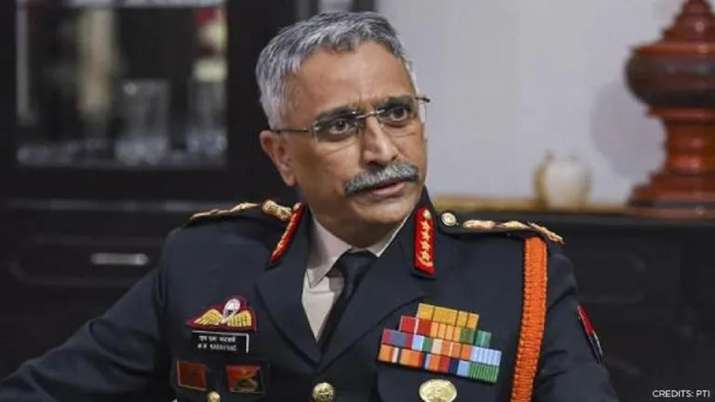
General Naravane said developments in Afghanistan have again focused on bringing the use of proxies and non-state actors to a decisive effect.
India is watching the trailer of future conflicts and its adversaries will continue with efforts to achieve their strategic goals, Army Chief General MM Naravane said on Thursday while discussing the national security challenges arising from China and Pakistan.
In an address at a symposium, he said that India is facing “unique, substantial and multi-domain” security challenges and developments on the northern borders have adequately necessitated the need for ready and capable forces with optimum component of boot on the ground. underlined by. To uphold the sovereignty and integrity of the country by modern technology.
Without directly naming China and Pakistan, General Naravane said disputed borders and state-sponsored proxy wars with nuclear-capable neighbours, were straining the security apparatus and resources.
He said the Army is focusing on “restructuring, rebalancing and reorientation” of its forces and the process has already been initiated and the force is committed to theater initiatives to ensure tri-service integration.
“We are watching trailers of future conflicts. These are being implemented daily in information battlefields, networks and cyberspace. They are also being played with unstable and active borders,” he said.
He said, “It is now for us to imagine the battlefield of tomorrow based on these trailers. If you look around you, you will get a feel for the reality of today.”
Air Chief Marshal VR Choudhary, Navy Chief Admiral R Hari Kumar and defense attachments from several countries participated in the seminar organized by the Center for Land Warfare Studies (CLAWS).
General Naravane said developments in Afghanistan have again focused on bringing the use of proxies and non-state actors to a decisive effect.
“These actors thrive on local conditions, innovatively exploiting low-cost alternatives to devastating effect and creating conditions that limit the full use of sophisticated capabilities that are available to the state,” he said.
The Army Chief said that India’s adversaries will continue to make efforts to achieve their goals against the country. “Our adversary will continue its efforts to achieve its strategic goals…like conflict using gray zone activities in the political, military and economic spheres, and do so in an amicable manner,” he said.
“The events of 2020 have been a testimony to the diversity of security threats across all domains and have drawn attention to non-contact and gray zone warfare. We need to enhance capabilities in both non-contact and contact modes of warfare,” Referring to the Eastern Ladakh face-off, the Army Chief said.
However, shedding light on the changing nature of conflicts, General Naravane said that the state art and the ancient Indian wisdom on the use of force, propounded many centuries ago, is “timeless and relevant” even today.
He said that the Armed Forces has embarked on an exploratory project to examine ancient Indian knowledge and wisdom for contemporary security challenges. In an indirect reference to China, he also said that some countries are challenging the globally accepted norms and rules-based system.
This, he said, has manifested in various forms including aggression and opportunistic action to change the “status quo”, down to an all-out war.
On the ceasefire with Pakistan along the Line of Control with Pakistan, the army chief said it is continuing “as we have negotiated from a strong position”.
In a significant move aimed at de-escalating tensions, Indian and Pakistani forces announced on February 25 last year that they would cease firing across the Line of Control, committing themselves to the 2003 ceasefire agreement.
Read also | Army plane crashes in Bihar’s Gaya, local people came to rescue Watch
General Naravane also said that the process of integration of the three services through theater is already progressing under a time bound plan and the Indian Army is fully committed to this transformation.
“We are further strengthening our operational experiences to account for these changes and it will remain a work in progress,” he added. Talking about the importance of modern technology, the army chief referred to the conflict between Israel and Hamas last year and said it strongly underscored the power of artificial intelligence.
“The recent attacks on the United Arab Emirates (UAE) last month by Yemen’s Houthi rebels using armed drones and missiles reflect the rapid spread of these disruptive technologies,” he said.
Also, General Naravane said that the subsequent mid-air interception of incoming missiles by the US and UAE forces is equally defined.
He said military terminology has expanded and traditional definitions have been reviewed. “The concept of victory itself has changed because lasting success, especially against non-state actors, remains elusive for most,” he said. However, the army chief said that hard power will continue to play an important role in future conflicts.
Highlighting the importance of achieving self-reliance in defence, he referred to the remarks of India’s first Chief of Defense Staff General Bipin Rawat that “we would like to be an army that fights and wins its wars with indigenous weapons and equipment.”
Read also | Jammu and Kashmir: Indian Army recovers Chinese grenades, pistols in Ganderbal, 3 arrested
,